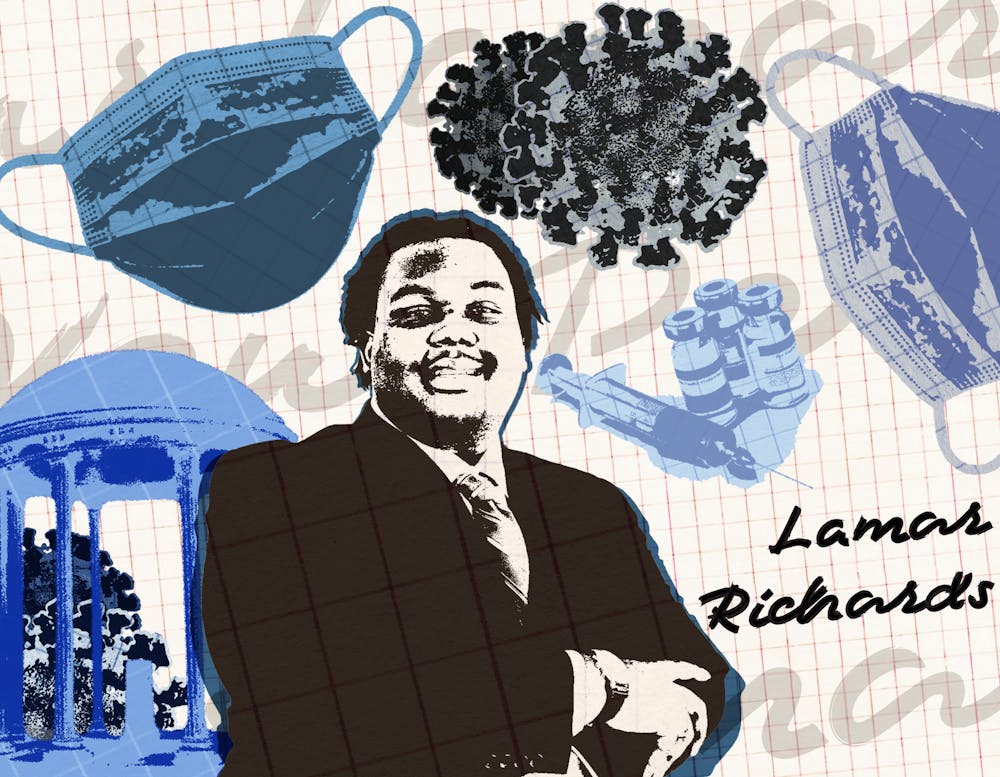“I think dealing with the uncertainty of COVID (has been the biggest challenge)," Solanki, a junior studying economics and statistics and analytics, said. "I know that’s almost a cliche at this point to say because we’ve been doing this for so many years.”
Richards and his team have addressed COVID-19 by encouraging vaccination, calling on administration to enforce stricter safety protocols and suggesting hybrid learning formats. Recently, they distributed 10,000 KN95 and N95 masks to students for free.
“We also wanted to balance safety and make sure we were setting a good example for the community,” Solanki said. “I think we found ways to take that challenge and tried to meet needs, especially with our mask distribution project that we did very recently that I think was quite a success. I think just working in an environment where things like ‘oh, can we meet as a large group?’ is something you have to consider that adds so many roadblocks into so many initiatives that we have really pushed to try to build out.”
At times, COVID-19-related roadblocks were challenging for Richards, but he said his hope for student government encouraged him to stay.
“Part of it is I really did believe in the change the student government could create,” Richards said. “If anything, this year has shown me that change is more than possible, change is in the cusp of our hands.”
Equity and inclusion on campus
Richards said he believes that the office of student body president was not made for people like him — specifically, for Black, gay men.
But, he said his identity has shaped the way he has approached his leadership role.
“A hundred years later, here we are," Richards said. "I am very much still feeling this role wasn’t made for me, and I think coming to this role, I expected to feel that. I think part of it, though, has allowed me to connect so well with our student body in that I didn’t read about this in a textbook.”
Allowing his experiences to guide him in his role is what Richards thinks is one of his strengths as a leader. It also guided him through the UNC Board of Trustees’ initial failure to grant tenure to Pulitzer Prize-winning journalist Nikole Hannah-Jones last summer.
“I know how it feels to feel forgotten or to feel like you’re not being heard and, in particular, to feel like your experiences that are inherently connected to your race or connected to your income are being ignored,” he said.
During his term, Richards started the Distinguished Lectureship on Racial Equity and Belonging. The lectureship features lecturers who must be an expert in the field of diversity, equity and inclusion and must bring forward both life experiences and renowned scholarship.
To get the day's news and headlines in your inbox each morning, sign up for our email newsletters.
Patricia Parker, director for the Institute for the Arts and Humanities, serves on the Distinguished Lectureship Search Committee. Through this experience, she said she has seen first hand Richards' impact as a leader at UNC.
"He is a student leader," she said. "In other words, he has not forgotten what it means to be a student. His background is a part of who he is as a person, and that makes up who he is as a leader.”
Mental health crisis
Richards also reflected on the loss of students on UNC’s campus during the fall semester.
“It was such a confusing time," he said. "I think that’s the best word to describe it. I was confused on how to support my team, direct my team and support the student body.”
Richards was concerned that the administration was not communicating effectively in times of crisis — a concern he said persists.
In response, his team called for a pause in instruction for students as the UNC community grieved the loss of fellow students in October and worked to continue the conversation surrounding mental health and wellness for students.
However, Richards said he was not exempt from these challenges himself.
“I recall one day sitting down and writing my resignation to our adviser," Richards said. "I think it would’ve been the first time a student body president has ever resigned. It was shortly after the Nikole Hannah-Jones issue and I was putting in 30-plus hours per week and in an 18-credit hour semester, on top of being a human and trying to be a friend to my peers and trying to have a life. I wasn’t managing.”
Richards encouraged his peers, and himself, to stay the course, even when facing difficult challenges.
“You have to set boundaries, and more importantly, you have to be okay that people won’t be okay with you setting these boundaries, but these boundaries are for you,” he said. “I think the first component to wellness is understanding that the boundaries that make you whole and make you okay, people may not always agree with them, but they are to make you okay, not to make them okay.”
Looking forward
In his last weeks in office, Richards looks forward to attending the Distinguished Lectureship on Racial Equity in March, his last speech as student body president when he gives his State of the University Address and the launch of his new campaign called Commitment to Carolina.
The campaign works to support students who are becoming actively involved in self-governance and advocacy issues on campus, aiming to raise $100,000 for student-led initiatives.
As Richards prepares to write a letter of his own to the next student body president, he wants to share the same message with the UNC community.
“Measure failure only in the context of things that you did not attempt," he said. "Always keep that in mind. You don’t have to succeed, but you have to try.”
@neptunejade
university@dailytarheel.com



